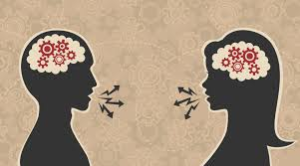By Fariha Fawziah

When humans have an abnormal mental and/or a physical condition, we tend to speak in an unclear tone, such as mumbling our words or perhaps having little creaks in our voices. These small changes are, however, undetectable to our ears. Scholars and researchers are now attempting to develop a technology to diagnose and predict everything from heart diseases to depression based on a strange source of data: How we talk.
Although initial results are promising, it still remains to be proven that analyzing speech patterns can generate accurate and useful diagnoses. One Boston company hoping to resolve this question is called Snode Heath. It was launched by PureTech, based on technology licensed from researchers at the Massachusetts Institute of Technology. Snode Heath wants to develop software that can screen for depression as well as respiratory and cardiovascular conditions. This could be a great help to those who struggle with these health problems in the future.
Additionally, IBM (International Business Machines Corporation) is teaming up with Watson Supercomputers to get researchers to try to predict, by speech patterns, whether patients are ever likely to develop a psychotic disorder. This could prevent people in the future from losing their minds, or at least reduce the percentage of people suffering from psychotic disorders. Many people might also be saved by getting proper medication during the early stages of a disease if, in the future, these voice patterns do connect clinically.
Christian Poellabauer, a cautious computer scientist, warns us that it might be very difficult to use these voice diagnostics clinically any time soon. Still, the research remains encouraging. A Berlin company has worked on diagnosing ADHD with voice recordings. A Boston company, called Cogito, is in the process of developing a voice analysis app now being tested on patients with bipolar disorder and depression.
Even so, this type of technology has both advantages and disadvantages. For instance, there are privacy concerns because there are some things that you don’t want a voice recorder to record. On the other hand, this technology could ultimately get so advanced that it could identify a patient just by his or her tone of voice.
If speech pattern analysis does work in the future, it will greatly ameliorate our health. One thing for sure, the information from the voice recorder will be useful for the patients and clinicians. Clearly, this technique looks to become a major advance in health care for the future.
[Citation: http://www.scientificamerican.com/article/the-sound-of-your-voice-may-diagnose-disease/